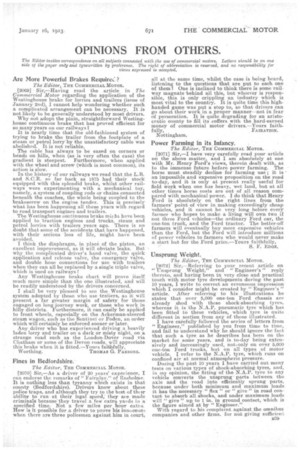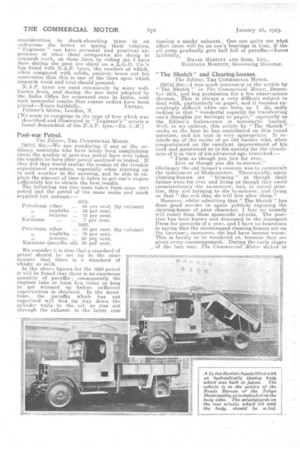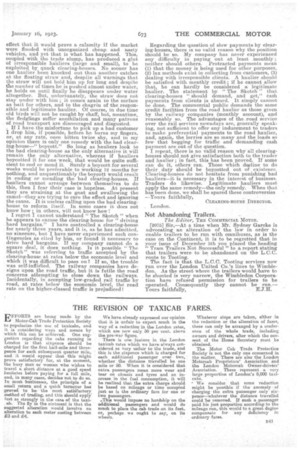OPINIONS FROM OTHERS.
Page 25

Page 26

Page 27

If you've noticed an error in this article please click here to report it so we can fix it.
The Editor invites correspondence on all subjects connected with the use of commercial motors. Letters should be on one side of the paper only and tynewritten by preference, The right of abbreviation is reserved, and no responsibility for views expressed is accepted.
Are More Powerful Brakes Require:?
The Editor, THE COMMERCIAL MoTort.
[2069] Sir,—Having read the article in The C ommercial Motor regarding the application of the Westinghouse brake for lorries and trailers (issue of January 2nd), I cannot help wondering whether such a complicated arrangement can be necessary. It is not likely to be generally understood by most drivers.
Why not adopt the plain, straightforward Westinghouse continuous brake that has proved efficient for 80 many years on our railways I It is nearly time that the old-fashioned system of trying to brake the trailer from the footplate of a steam or petrol lorry•by the unsatisfactory cable was abolished. It is not reliable.
The cable has always to be eased on corners or bends on hills, when (as is very often the case) the gradient is steepest. Furthermore, when applied with the wheel and screw (which is most common), its action is slow.
In the history of our railways we read that the L.B. and S.C.R. so far back as 1875 had their stock equipped with this splendid brake, whilst other railways were experimenting with a mechanical toy, namely, a system of coupling rods or chains connected beneath the coaches, the whole being coupled to the brakeserew on the engine tender. This is precisely what has been happening all these years with regard to road transport engines and trailers.
The Westinghouse continuous brake inieht have been applied to traction engines and trucks, steam and petrol lorries with trailers years ago. There is no doubt that sonic of the accidents that have happened, with their serious loss of life, might have been avoided.
I think the diaphragm, in place of the piston, an excellent improvement, as it will obviate leaks. But why the complicated driver's hand valve, the quick application and release valve, the emergency valve, and double hose connections for use with trailers when they can all be replaced by a single triple valve, which is used on railways? Any Westinghouse brake chart will prove itself much more simple than the one illustrated, and will be readily understood by the drivers concerned.
I shall be very pleased to sea the Westinghouse system adopted by those who use trailers, as it will present a far greater margin of safety for those engaged on long-journey work, or those who work in hilly districts. Furthermore, it can easily be applied to front wheels, especially on the Ackerman-steered steam wagon, such as the 'Sentinel or Foden, an order which will certainly be enforced sooner or later.
Any driver who has experienced driving a heavily laden lorry and trailer on a dark or misty night, on a strange road such as the London-Dover road via Chatham or some of the Devon roads, will appreciate this brake when it is fitted.—Yours faithfully,
Worthing. TROMAS G. PARSONS.
Fines in Bedfordshire.
The Editor, THE COMMERCIAL MOTOR.
[2070] Sir,—As a driver of 20 years' experience, I can endorse the remarks of " of flushohne. It is nothing less than tyranny which exists in that county (Bedfordshire). Drivers know . about these police traps, and although they try to the best of their ability to run• at their legal speed, they are made criminals because'they travel a few extra ya.ials in 'a specified time. Not a few miles per hour extra. How is it possible for a driver to prove his innocence when there are three policemen against him in court,
all at the same time, whilst the case is being heard, listening to the questions that are put to each one of them ? One is inclined to think there is some railway magnate -behind all this, but whoever is responsible, this is only crippling an industry which is most vital to the country. It is quite time this highhanded game was put a stop to, so that drivers can go about their work in a proper manner—not in fear of persecution. It is quite degrading for an aristocratic county to fill its coffers with the hard-earned money of commercial motor drivers.—Yours faith faith
. FAIRATION. fully,
Power Farming in its Infancy.
The Editor, • THE COMMERCIAL MOTOR. [2071] Sir,—I ha-vs very carefully read your article on the above matter, and I am absolutely at one with Mr. Henry Ford's views, therein dealt with, as to the immense future before power farming. The horse must steadily decline for farming use • it is an impossible and expensive proposition on the road to-day, and it is only at present really useful for field work when one has heavy, wet land, but at all other times horse costs are out of all reason compared with mechanical power. I do think that Henry Ford is absolutely on the right lines from, the farmers' point of view in making exceedingly cheap vehicles, and it cannot be very long before every farmer who hopes to make a living will own two if not three Ford vehicles—the ordinary Ford ear, the one-ton truck, and the Ford tractor. The better-off farmers will eventually buy more expensive -vehicles than the Ford, but the Ford will introduce millions of power vehicles to farmers who would never make a start but for the Ford price.—Yours faithfully, S. F. EDGE.
Unsprung Weight.
The Editor, THE COMMERCIAL MOTOR.
[20'7-2] Sire—Referring to your recent article on " tTnsprung Weight," and " Engineer's" reply thereto, and having been in very close and practical touch with motor tyre developments during the past 30 years, I write to correct an erroneous impression which I consider might be created by. " Engineers" article. After referring to his illustrations he states that over 5,000 one-ton Ford chassis arc already shod with these shock-absorbing tyres, whereas it is The N.A.P. pneumatic tyre which has been fitted to these vehicles, which tyre is quite different in section from any of those illustrated.
I have carefully followed the series of letters from " Engineer," published by you from time to time, and fail to understand why he should ignore the fact that such a tyre as he describes has been on the market for some years, and is to-day being extensively and increasingly used, not.only on over 5,000 one-ton Ford trucks, but. on all types of motor vehicle. I refer to the N.A.P. tyre, which runs on confined air at normal atmospheric pressure.
During the past 10 years I have carried out many tests on various types of shock-absorbing tyres, and, in my opinion, the fitting of the N.A.P. tyre to any vehicle converts the unsprung parts between the axle and the road into efficiently sprung parts, because under both minimum and maximum loads it has the necessary "flex " or " give " in road contact to absorb all shocks, and under maximum loads will " give " up to 1 in. in ground contact, which is the figure aimed at by "Engineer." With regard to his complaint against the omnibus companieS and other firms, for not giving sufficient consideration to shock-absorbing tyres in an endeavour the better to spring their vehicles, " Engineer" can have personal and practical experience of what these .companies are doing in research work, on these lines, by riding (as I have done during the past ten days) on a L.G.O. Co.'s bus fitted with N.A.P. tyres, the comfort of which, when compared with solids, entirely bears out his contention that this is one of the lines upon which research work and trial should proceed. • N.A.P. tyres are used extensively by many wellknown firms, and during the war were adopted by the India Office for armoured cars in India, with such successful results that repeat orders have been
placed—Yours faithfully, EXPERT. Palmer's Green, London, N.
[We seem to recognize in the type of tyre which was described and illustrated in " Engineer's " article a
lineal descendant of the tyre.—ED. fLMJ Post-war Petrol.
The Editor, THE COMMERCIAL MOTOR.
12073] Sir,—We are wondering if any of the ordinary motorists who have lately been complaining about the quality of past-war petrol have ever taken the trouble to have their petrol analysed or tested. If they did they would realize the reason of the trouble experienced nowadays, especially when starting up in cold weather in the morning, and be able to explain the amount of time it takes to get one's engine sufficiently hot to obtain the best results.
The following are two tests taken from some 1915 petrol and the petrol of the same make and mark supplied last autumn :—
1915.
Petroleum ether ... 45 per cont. (by volume) naphtha. ... 35 per cent.
f
Kersene
benzine. 13 per cent.
... 7 per cent.
1922.
Petroleum ether ... 20 per cent. (by volume) naphtha ... 35 per cent. ff benzine ... 25 per cent. Kerosene (paraffin oil) 20 pd.' cent. •
We consider it is time that a standard of petrol should he set up in the same manner that there is a standard of whisky or milk.
In the above figures for the 1922 petrol it will be found tbat there is an enormous quantity of paraffin ; consequently the engines take at least five times as long to get warmed up before sufficient vaporization is obtained. In the meantime, the paraffin which has not vaporized will find its way down the cylinder walls to the oil, or else out through the exhaust—in the latter case
Pf
causing a smoky exhaust. One can quite see what effect there will be on one's bearings in time, if the oil sump gradually gets half full of paraffin.—Yours faithfully,
DAVID MOSELEY AND SONS, LTD., REGINALD MOSELEY, Governing Director.
"The Skotch" and Clearing-houses.
The Editor, THE COMMERCIAL MOTOR. 12074] Sir,—.I was much interested in the article by " The Skotch." in The Commercial Motor, December 20th, and beg permission for a few observations thereon. This is always a very difficult subject to deal with, particularly on paper, and it becomes exceedingly difficult when one feels, as I do, sadly lacking in that " wonderful capacity for transferring one's thoughts (or feelings) to paper," especially as the Editor's forbearance is necessarily limited. -Well, in my opinion, this article by. " The Sketch" ranks as the best he, has contributed on this vexed question, and his text is very appropriate. It reminds me of the motto of an old farmer who, when congratulated on the excellent improvement of his land and questioned as to his anxiety for the cleanliness of it in view of his advanced age, remarked:— " Farm as though you live for ever,
Live as though you die to-morrow." • Obviously the old farmer's concern was to counteract the indictment of Shakespeare. Theoretically, many clearing-houses are " farming " as though their future were for ever and living as though they could conscientiously die to-morrow, but, in actual practice, they are farming to die to-morrow, and living so that " the evil they do will live after them."
However, whilst admitting that " The Sketch " has done good service in again publicly exposing the clearing-house of poor character, I fear no remedy will result from these spasmodic attacks. The post tion has been known and discussed in the transport Press for upwards of 'a year, and •I have no hesitation in saying that the mismanaged clearing-houses are on the increase ; moreover, the bad have become worse. This is hardly to he wondered 'at, because they are given every encouragement. During the early stages of the late war. The Commercial Motor stated in
effect that it would prove a calamity if the market were flooded with unorganized cheap and nasty vehicles, and yet that is what has happened. This, coupled with the trade slump, has produced a glut of irresponsible hauliers (large and small), to be exploited by quack clearing-houses. No sooner has one haulier been knocked out than another catches at the floating straw and, despite all warnings that the straw will not hold him up for long and despite tlae number of times he is pushed almost under water, he holds on until finally he disappears under water altogether. But, unfortunately, the straw does not stay under with him ; it comes again to the surface as bait for others, and to the chagrin of the responsible and legitimate haulier. Of course, in due time old birds will not be caught by chaff, but, meantime, the fledglings suffer annihilation and many patrons of road transport are discouraged and disgusted. If I have, the misfortune to pick up a bad customer
drop him, if pessible, before he burns my fingers, or, at any rate, once bitten twice shy, and in my opinion there is only one remedy with the bad clearinghouse—" boycott." So long as hauliers look to the bad clearing-house as the only alternative it will remain the only alternative, whereas if hauliers boycotted it for one week, that would be quite sufficient to end or mend it. Surely a boycott for several weeks would be preferable to working 12 months for nothing, and unquestionably the boycott would result in ending or mending the bad clearing-houses. If hauliers cannot arrange between themselves to do this, then I fear their case is hopeless. At present they are straining at the gnat and swallowing the camel—they are trying to cure the effect and ignoring the cause. It is useless calling upon the bad clearinghouse to reform itself. In some cases it does not know how ; in others, will not know how !
I regret I cannot understand " The Skotch " when he appears to excuse the clearing-house for "driving hard bargains." I have controlled a clearing-house for nearly three years, and it is, as he has admitted, no sinecure, but I have never•experieneed such contingencies as cited by him, or found it necessary to drive hard bargains. If my company cannot do a square deal, it does nothing. Is it possible " The Skotch" was referring to traffic accepted by the clearing-house at rates below the economic level and which it was difficult to pass on If so, the trouble was self-inflidied. The railway companies have designs upon the road traffic, but it is futile the road concerns attempting to close down the railways. Incidentally, in accepting low-graded rail traffic by road, at rates below the economic level, the road rate on the higher-classed traffic is prejudiced ! Regarding the question of slow payments by clearing-houses, there is no valid reason why the position should be so. My company has never experienced any difficulty in paying out at least monthly ; neither should others. Protracted payments mean (I) that the money is being used for other purposes, (2) lax methods exist in collecting from customers, (3) dealing with irresponsible clients. A haulier should be satisfied with monthly credit ; if he cannot allow that, he can hardly be considered a legitimate haulier. The statement by "The Skotch that clearing-houses " should demand, and get," cash payments from clients is absurd. It simply cannot he done. The commercial public demands the same credit facilities from the road haulier as those given by the railway companies (monthly account), and reasonably so. The advantages of the road service over the rail services nowadays are, generally speaking, not sufficient to offer any inducement to traders to make preferential payments to the road haulier, and, again, the lorries are so many and the loads so few that begging for traffic and 'demanding cash payment are out of the question.
I repeat, there is no valid reason why an clearinghouses should not give satisfaction both to the trader and haulier ; in fact, this has been proved. If some can do it, others can. Those which deicline to do their duty should be boycotted out of existence. Clearing-houses do not hesitate from punishing bad hauliers—it is necessary in the interest of business. Traders do likewise. Legitimate hauliers must apply the same remedy—the only remedy. When that has been done, we shall be spared these controversies —Yours faithfully,
CLEARING-ROI:SE DIRECTOR. London.
Not Abandoning Trailers.
The Editor, TEE COMMERCIAL MOTOR.
120751 Sir,—At a time when HS% Sydney Garcke is advocating an alteration of the law in order to enable trailers to be run with omnibuses, as is the case on the Continent, it is to be regretted that in your issue of December eth you placed the heading " Tram Trailers Not Successful " to a report stating that trailers were to be abandoned on the L.C.C. route to Tooting.
The fact is that the L.C.C. Tooting services now run over the London United Co.'s lines to Wimbledon. As the street where the trailers would have to he shunted is very narrow, the Wimbledon Corporation have refused permission for trailers to be operated. Consequently they cannot be Yours faithfully, E. J.H.






























